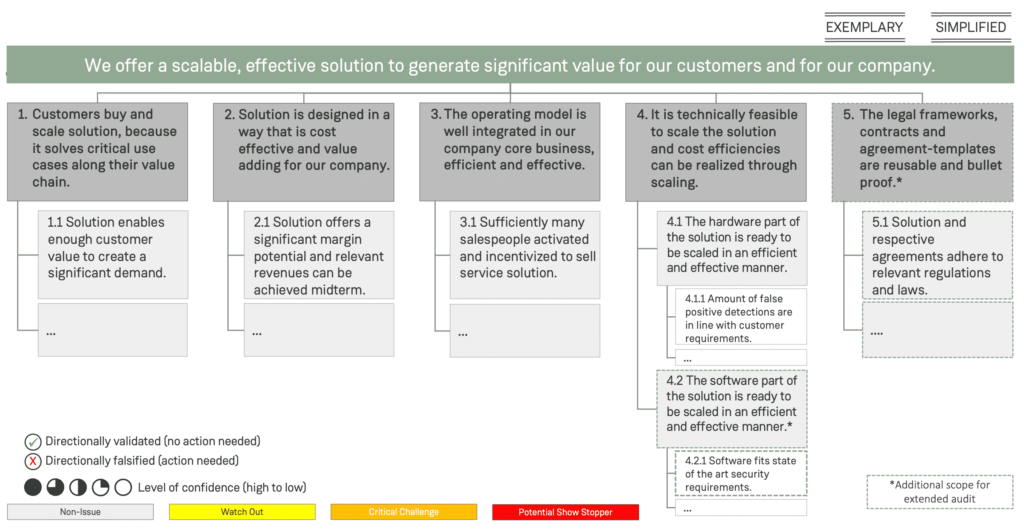Intro and results
The scaling of digital business models is complex and uncertain, and a structured approach is required to successfully implement it. Excubate’s 4-week digital business model audit enables early identification of potential scaling barriers. In addition, the derivation and recommendation of tangible action items to address identified issues are in focus. The aim is to provide a fast and pragmatic solution, to ensure digital business models are future-proof and scalable. A successful business model audit also creates a blueprint for evaluating and scaling further digital products on the client side.
Excubate’s 4-week digital business model audit has three major outcomes:

Timeframe & structure
The audit consists of three steps: Preparation, execution, and recommendation/future enablement:
- Audit preparation – week 1: In a kickoff workshop, objectives and overall timeline get clarified and the status quo of the business model is discussed. Important internal materials and a stakeholder overview will be shared by the client, and first interviews will be scheduled and conducted. The initial hypothesis tree, prepared by Excubate, will be refined according to specific project team requirements and latest insights on the business model.
- Audit execution – weeks 2 & 3: In weeks 2 and 3 all hypotheses will be substantiated by screening materials and conducting as many interviews with internal stakeholders and experts as possible. In an iterative approach hypotheses deep dives with status quos get created and assessed based on Excubate experience and derived learnings. Suggested actions are formulated, based on cross-industrial project experience, market best practices and deep dive expert interviews
- Recommendations/Enablement – week 4: In the last week of the audit an overall interpretation of the results will be made, recommendations will be prepared, and the main findings will be presented to the company management. Focus lies on the formulation of tangible & actionable recommendations – short-term as well as strategic/long-term.

4-week timeline of digital business model audit
Requirements and potential challenges
There are a variety of requirements to keep in mind to ensure a successful digital business model audit:
- Tough timeline: Four weeks is a short time frame – audit must be conducted with discipline in a fast and pragmatic manner in order to create the desired outcomes
- Availability and willingness to participate: Required stakeholders, partners and experts should be involved as early as possible to make sure all required interviews can be conducted within the timeframe. Some stakeholders might need convincing to share their insights and their time – a close alignment with top management helps to create the necessary momentum and mandate.
- Prioritization of hypotheses: Within four weeks not all hypotheses can be analyzed in the same depth. A constant prioritization, realignment with project team and focusing of the most critical topics is crucial, to ensure the most valuable outcomes. Focus should always be on most imminent challenges / roadblocks and the most dangerous, potential scaling barriers.
- Setting the right tone: Key to a successful audit is to have the project team on one’s side. While audits have a negative connotation, a constant reminder that the aim is to support not to criticize is of major importance. Deep dives need to be formulated in a clear and precise way, pointing out rational observations and constructive feedback for improvement.’
How it is done: Basis for the business model audit is a hypothesis tree
Excubate uses a hypothesis-based approach (see graphic below). Starting point is the main hypothesis, which states the answer to the question: “What do we have to believe in, in order to scale a successful digital business model?”. It is then deconstructed into several subbranches, reflecting main areas of the value generation, like e.g., sufficient customer value and demand, a well-designed operating model, or an overall working software solution. Each subbranch is then expended by a set of sub-hypotheses, that can respectively be validated or falsified and that are each assessed. Each of the hypotheses’ assessments is furthermore marked with a Harvey ball, indicating the level of confidence (from low to high), based on the information base that supports the assessment.

For each sub-hypothesis, a deep dive on pager is then created, featuring four content blocks:
- Status quo – A rational summary of collected insights
- Assessment – The interpretation of status quo by Excubate, structured by “the good, the bad, the ugly”
- Recommended action – A collection of tangible action items to be taken to solve identified roadblocks
- Sources – All sources used to create the deep dive
Within the audit, up to 25 interviews with relevant internal (e.g., product (HW and SW), legal, sales, marketing) and external (e.g., distributors, customers, product partners) stakeholders will be conducted and a large variety of materials will be screened. Besides interviews with internal key stakeholders, the feedback of well selected experts is crucial, to enable both, an inside in and outside in view. These experts should be selected specifically for the respective business model in scope and must bring deep expertise especially in areas of identified challenges.
Examples for experts involved in past Excubate audits are former software corporation top executives, IoT startup CEOs, senior sales managers from successful IoT companies, software integration experts (e.g., of Microsoft or SAP) or senior software developers & code experts. Suggested actions to address identified roadblocks are then based on the vast project experience of Excubate and on researched market best-practices. Here the focus lies on pragmatic and quickly implementable actions, that can heal roadblocks short-term and ensure a smooth scaling long-term.
Here are some examples to make the hypothesis-based methodology more tangible:
In this case, the digital business model was an AI-based temperature sensor than enables production efficiency gains in high-temperature production environments. The main hypothesis is defined in a short and concise way. In our example, the main hypothesis states, that the client company offers a scalable, effective digital solution to generate significant value for their customers and for their company. For this to be true there are many other sub-hypotheses that must be validated.
Example 1: First branch: “Customers buy and scale solution because it solves critical use cases along their value chain.”
To validate the overlying hypothesis of the first branch, it must be ensured that the solution creates enough customer value to create demand which would then be a sub-hypothesis of the first branch’s hypothesis.
- To confirm this sub-hypothesis interviews with pilot customers and sales personnel need to be conducted, and the answers must be documented and assessed. In this example, interviews, and previous studies showed that customers understand and cherish the solution, and interviews with the sales force concluded that there were no problems so with the customers’ ability to understand the value proposition of the solution.
- Based on this information the assessment of Excubate was positive, based on a high confidence.
- There was no need for suggested action, since this area of the business model was under control and well aligned
Example 2: Third branch: “The operating model is well integrated in our company core business, efficient and effective.”
For this hypothesis to be true, sufficiently many salespeople must be activated and enabled to sell the service solution.
- Interviews with sales force and with the digital solution team were conducted. The identified bottom line was, that the sales team does not feel comfortable yet with the switch from selling traditional hardware products to selling IoT SaaS solutions.
- This often seem challenge is a make-or-break factor in the scaling of digital business models. The hypothesis was directionally falsified, with a high level of confidence.
- Excubate’s suggestion towards the client consisted of a variety of tangible action items. These ranged from a suggested new trainings approach and alignment with the sales force, to a rework of the overall sales process, to the creation of an end-to-end customer success approach. All action items were described on a detail level, that enabled a short-term execution.
Have we piqued your interest in our 4-week digital business model audit approach?
Contact us (jan.hartung@excubate.de), to evaluate the scalability potential of your digital business models your company.




